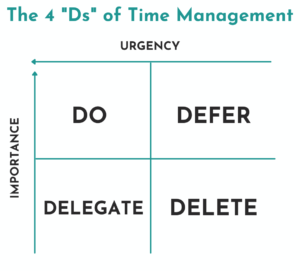Time management is a crucial skill that can significantly impact one’s productivity and overall success. Effectively managing your time allows you to accomplish more in less time, reduce stress, and achieve a better work-life balance. One helpful framework for mastering time management is the “Four Ds”: Delete, Delegate, Defer, and Do.
By understanding and implementing these principles, you can take control of your schedule and maximize your efficiency.
Delete
The first “D” in the time management framework is “Delete.” It involves identifying and eliminating tasks and activities that do not contribute to your goals or priorities. In today’s fast-paced world, we are often bombarded with non-essential tasks, distractions, and time-wasting activities. By learning to say “no” to these non-essential items, you can free up valuable time and mental energy for more meaningful and impactful endeavors. Examples of tasks to delete might include excessive meetings, low-priority projects, or time-consuming but nonessential activities. By regularly evaluating your commitments and responsibilities, you can declutter your schedule and focus on what truly matters.
Delegate
The second “D” stands for “Delegate.” Many individuals struggle with the misconception that they must handle everything themselves. However, effective time management often involves recognizing when to delegate tasks to others who are better suited to handle them. Delegating not only frees up your time but also allows others to develop their skills and contribute to the team’s success. When considering what tasks to delegate, focus on activities that can be performed by others without sacrificing quality. This might include administrative tasks, routine assignments, or projects that are better suited for someone with specific expertise. By delegating effectively, you can streamline your workload and empower your team members to take on greater responsibilities.
Defer
The third “D,” “Defer,” emphasizes the importance of prioritizing tasks based on their urgency and importance. Not all tasks need to be completed immediately, and understanding when to defer certain activities is crucial for effective time management. By deferring non-urgent tasks, you can allocate your time and resources to more pressing matters without feeling overwhelmed. Using tools such as to-do lists, calendars, or task management apps can help you identify tasks that can be deferred without negatively impacting your productivity. By scheduling these tasks for a later time or date, you can maintain focus on your immediate priorities while ensuring that important but less urgent tasks are not forgotten.
Do
The final “D” in the time management framework is “Do.” This represents the tasks that require your immediate attention and action. By promptly addressing these tasks, you can prevent them from piling up and causing stress or missed deadlines. Embracing a proactive approach to tackling important tasks is key to maintaining productivity and achieving your goals. When applying the “Do” principle, consider using time-blocking techniques to allocate dedicated time for focused work. This can help you minimize distractions and maximize your efficiency when completing critical tasks. Additionally, practicing effective decision-making and avoiding procrastination can further enhance your ability to “Do” tasks in a timely manner.
Infographic: The Four Ds of Time Management

Mastering time management is a continuous process that requires self-awareness, discipline, and strategic thinking. By incorporating the Four Ds—Delete, Delegate, Defer, and Do—into your daily routine, you can set yourself up to succeed.





